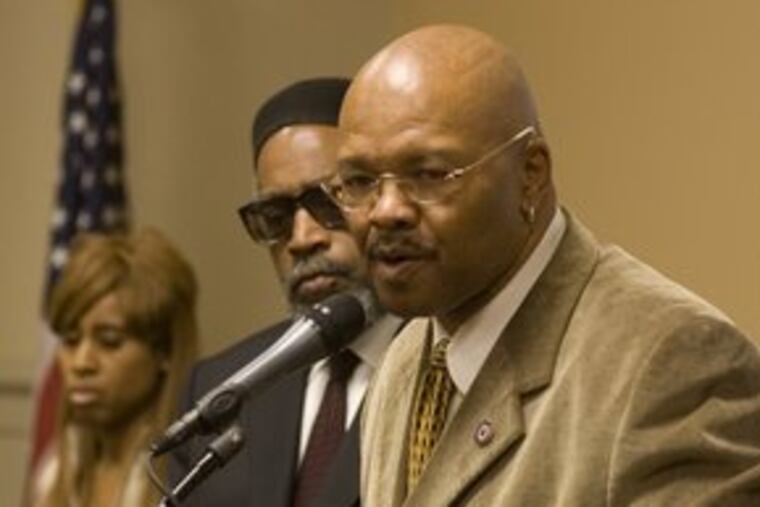Minorities lobby for a bigger slice
Small-business contractors, at a news conference on Convention Center jobs, said a big issue was the way contracts were bundled.

Eric Smith is an African American demolition contractor in Philadelphia. But "I don't want to be a minority contractor," he says.
When City Council votes tomorrow on the issue of minority contracts and labor for the $700 million Convention Center expansion, Smith will be watching.
Smith leads a West Philadelphia company, Bond Construction Co., now doing a $4.4 million demolition job on a shopping center on Parkside Avenue.
Smith, 44, wants more than small slices of the pie dished out so a prime contractor can make its minority quota. He wants steady business so that he does not have to have a $4.4 million contract one year and then worry about keeping the lights on the next.
"You have to give people an opportunity to grow," said Smith, who was among the speakers at a news conference yesterday on minority participation in construction. Other speakers included developer Kenny Gamble and Sam Staten Jr., president of Laborers International Union Local 332.
Smith also wants to give folks - mostly minority, but others as well - the chance to come up the way he did, through hard work and union support.
"I'd like to see more avenues for people into the unions," said Smith, a member of the International Union of Operating Engineers.
While Smith is a small minority contractor, Walter Palmer 3d heads an organization of the city's largest union contractors, who are, for the most part, white.
And both say failed social policy is the reason that minorities have not made more advances in construction.
"Public policy has created a culture of skepticism," said Palmer, president of the General Building Contractors Association.
The focus on numbers leads to problems, they say.
Sometimes, Smith said, the numbers are phony. Sometimes, minority contractors are forced to "employ" workers from a white-owned company, so the numbers work.
And sometimes, to make the numbers work, majority contractors "partner" with minority contractors who may not be able to handle the work, Palmer said.
"It has created a false market for a group of contractors who exist in that [public-project] world," Palmer said.
One of the biggest issues for contractors, Palmer and Smith explained, is how contracts are bundled together when they are put out for bid.
Normal practice now is to put out one bid request, for example, for all the site work. But that may be too big for any small business - minority or otherwise. There might be insufficient cash flow to obtain insurance and performance bonds.
But if there were separate bids for sidewalks, and curbing, and street paving, the jobs might be small enough to handle. "That's where public policy can help the small-business person," Palmer said.
Then, as the other contractors see the quality of the work, opportunities arise.
"You start with getting your foot in the door, and they get more and more comfortable with you," Smith said. His initial assignment at the shopping center was for $1.7 million worth of work. Then it doubled to $3.4 million, and lately, he has added a million dollars to the contract.
Years ago, Smith wanted to be an electrician. He went to a phony trade school, which cost him time and money and did not lead to a job. "I hit the bricks" and got work as a nonunion construction laborer.
In 1986, while working at a job at the University of Pennsylvania, a white union official from the Operating Engineers praised Smith's work ethic and sent him to the union hall. The union was under court order to include more minorities.
Smith passed the entrance test and completed a training program required by the court order, he said.
In 2000, Smith started his own business. Now, he has 25 employees.
Even so, he had to pay $14,000 and search hard to find a broker willing to agree to provide the $10 million liability insurance policy needed to bid on the next phase of demolition at the Convention Center. He would like to land $2 million in contracts.
"I can't tear down a big building at Broad and Race," he said, "but I put in for a couple of the smaller ones."
Kenny Gamble's views, on video: http://www.philly.
com/inquirer/ multimedia/ 12362261.html
EndText